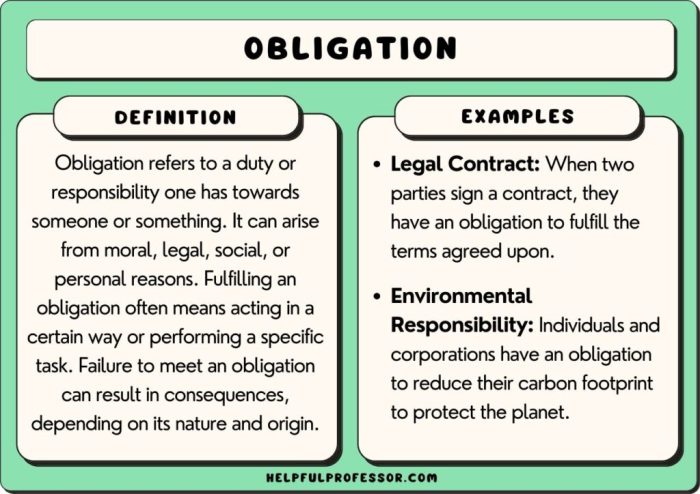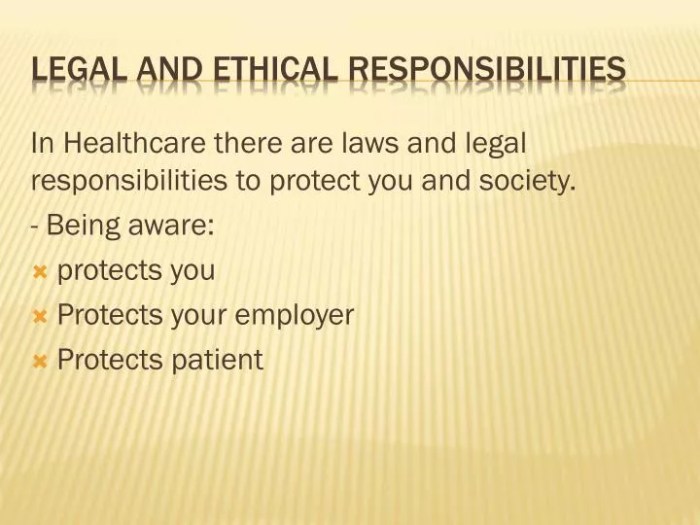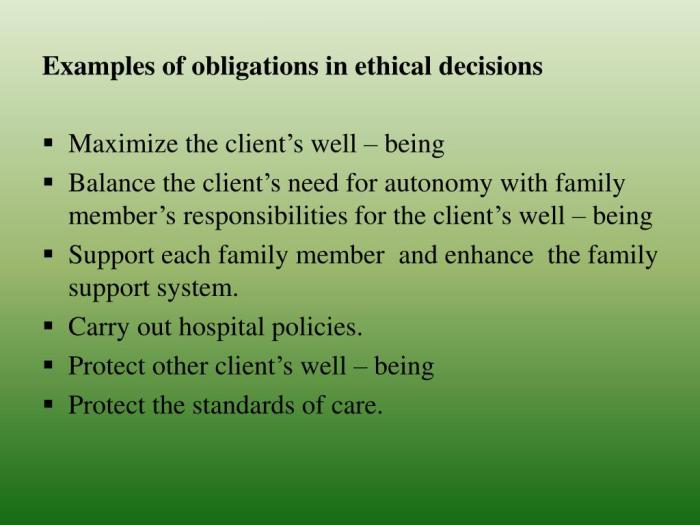What are the ethical obligations of a lawyer? This is a question that all lawyers must ask themselves throughout their careers. The legal profession is a demanding one, and lawyers are often faced with ethical dilemmas. It is important for lawyers to be aware of their ethical obligations so that they can make the right decisions when faced with these challenges.
This article will provide an overview of the ethical obligations of lawyers. We will discuss the duty to clients, the duty to the court, the duty to opposing counsel, and the duty to society. We will also provide some tips on how to make ethical decisions.
Duty to Client

Lawyers have a fundamental duty to act in the best interests of their clients. This duty is rooted in the fiduciary relationship between lawyer and client, which imposes a high level of trust and responsibility on the lawyer.
Fiduciary Duty
The fiduciary duty owed to clients requires lawyers to:
- Act in the client’s best interests, even if it means sacrificing their own interests.
- Avoid conflicts of interest that could impair their ability to represent the client effectively.
- Maintain the confidentiality of all client communications.
Duty of Loyalty and Confidentiality
The duty of loyalty requires lawyers to put their client’s interests first. This means that lawyers cannot represent clients with conflicting interests, and they must avoid any actions that could harm their client’s case.
The duty of confidentiality requires lawyers to keep all client communications confidential. This includes both written and oral communications, as well as any information that the lawyer learns about the client in the course of their representation.
Duty of Competence and Diligence
The duty of competence and diligence requires lawyers to provide their clients with competent and diligent representation. This means that lawyers must have the necessary skills and knowledge to handle their client’s case, and they must work diligently to achieve the best possible outcome for their client.
Duty to the Court

As an officer of the court, lawyers have a paramount duty to maintain the integrity of the judicial system and to assist the court in the administration of justice. This duty encompasses a range of obligations, including the duty to be truthful and forthright with the court, to respect the court and its proceedings, and to avoid frivolous or vexatious litigation.
Duty to be Truthful and Forthright with the Court
Lawyers owe a duty to be truthful and forthright with the court in all matters. This duty requires lawyers to disclose all material facts to the court, even if those facts are不利to their client’s case. Lawyers must not knowingly make false statements to the court, or withhold or misrepresent material evidence.
Duty to Respect the Court and its Proceedings
Lawyers must respect the court and its proceedings. This duty requires lawyers to behave in a professional and respectful manner towards the judge, court staff, and other parties involved in the case. Lawyers must not engage in disruptive or disrespectful behavior, and must comply with all court rules and procedures.
Duty to Avoid Frivolous or Vexatious Litigation
Lawyers have a duty to avoid filing frivolous or vexatious lawsuits. A frivolous lawsuit is one that has no legal basis and is filed for the purpose of harassment or delay. A vexatious lawsuit is one that is filed repeatedly and without merit.
Lawyers must carefully evaluate the merits of a case before filing a lawsuit, and must not file a lawsuit unless they believe it has a reasonable chance of success.
Duty to Opposing Counsel
Lawyers owe a duty to opposing counsel to conduct themselves in a courteous and professional manner. This duty includes the obligation to:
- Be respectful of opposing counsel’s opinions and arguments, even if you disagree with them.
- Avoid making personal attacks on opposing counsel.
- Cooperate in discovery by providing all relevant documents and information in a timely manner.
- Refrain from engaging in any conduct that would obstruct the administration of justice.
Duty to be Courteous and Respectful
Lawyers should always treat opposing counsel with respect, even if they disagree with their positions. This means being polite and respectful in all communications, both written and oral. It also means avoiding personal attacks or insults.
Duty to Cooperate in Discovery
Lawyers have a duty to cooperate in discovery by providing all relevant documents and information in a timely manner. This duty is essential to the fair administration of justice. Without cooperation from both sides, it would be difficult to ensure that all relevant evidence is presented at trial.
Duty to Avoid Personal Attacks
Lawyers should avoid making personal attacks on opposing counsel. This includes attacks on their character, their motives, or their competence. Personal attacks are unprofessional and can damage the reputation of the legal profession. They can also make it difficult to resolve disputes in a fair and impartial manner.
Duty to Society
Lawyers have a fundamental duty to society, which encompasses promoting justice and fairness, upholding the rule of law, and protecting the public interest. This duty requires lawyers to act in a manner that benefits society as a whole, rather than solely pursuing the interests of their clients.
Promoting Justice and Fairness
Lawyers have a duty to promote justice and fairness in all their dealings. This means acting with integrity, honesty, and impartiality, and ensuring that all parties have access to the legal system on an equal basis. Lawyers should also advocate for policies and laws that promote social justice and protect the rights of the disadvantaged.
Upholding the Rule of Law
Lawyers have a duty to uphold the rule of law, which means adhering to the principles of fairness, equality, and due process. They should not engage in any conduct that undermines the integrity of the legal system, such as obstructing justice or engaging in unethical practices.
Lawyers should also respect the authority of the courts and follow all lawful orders.
Protecting the Public Interest
Lawyers have a duty to protect the public interest, which means acting in a manner that benefits society as a whole. This may involve representing clients who are unable to afford legal representation, advocating for policies that promote the public good, or reporting unethical or illegal conduct by other lawyers.
Lawyers should always put the interests of the public ahead of their own personal interests.
Ethical Rules: What Are The Ethical Obligations Of A Lawyer
Ethical rules are the foundation of a lawyer’s professional conduct. They govern every aspect of a lawyer’s practice, from the way they interact with clients to the way they represent them in court. Ethical rules are essential to ensuring that lawyers maintain the highest standards of professionalism and integrity.
There are many different ethical rules that lawyers must follow. Some of the most important rules include:
Duty to Client
- The duty to provide competent representation
- The duty to zealously advocate for the client’s interests
- The duty to maintain client confidentiality
- The duty to avoid conflicts of interest
Duty to the Court
- The duty to be honest and forthright with the court
- The duty to comply with the court’s orders
- The duty to avoid frivolous or vexatious litigation
Duty to Opposing Counsel
- The duty to treat opposing counsel with courtesy and respect
- The duty to avoid personal attacks
- The duty to cooperate in discovery
Duty to Society
- The duty to uphold the law
- The duty to promote access to justice
- The duty to protect the environment
These are just a few of the many ethical rules that lawyers must follow. By adhering to these rules, lawyers can help to ensure that the legal system is fair and just for all.
Professionalism
Professionalism is a cornerstone of the legal field. It encompasses the ethical obligations lawyers have to maintain their integrity and reputation, ensuring the public’s trust in the justice system.
Professional organizations like the American Bar Association play a vital role in promoting ethical conduct and disciplining members who violate ethical rules.
Ethical Dilemmas
Lawyers may face ethical dilemmas, such as conflicts of interest or confidentiality breaches. Resolving these requires careful consideration of the ethical rules and potential consequences.
Confidentiality and Conflicts of Interest
Maintaining confidentiality is paramount. Lawyers must avoid conflicts of interest that could compromise their clients’ interests or the integrity of the legal system.
Technology in the Legal Profession
Technology has transformed the legal profession. Lawyers must navigate ethical considerations related to data privacy, social media use, and artificial intelligence.
Continuing Legal Education
Continuing legal education is crucial for lawyers to stay abreast of legal developments and maintain their competence.
Competent Representation
Lawyers have an ethical obligation to provide competent representation to their clients. This includes avoiding frivolous or vexatious litigation.
Respectful Relationships
Maintaining respectful relationships with opposing counsel and the judiciary is essential for the smooth functioning of the legal system.
Ethical Obligations to Society
Lawyers have ethical obligations to society, including pro bono work and upholding the rule of law.
Conflicts of Interest
Conflicts of interest are a significant ethical concern for lawyers. They arise when a lawyer’s personal or professional interests conflict with their duty to their client. Conflicts of interest can jeopardize the lawyer’s objectivity, impair their judgment, and undermine the public’s trust in the legal profession.
There are three main types of conflicts of interest: actual conflicts, potential conflicts, and imputed conflicts. An actual conflict exists when a lawyer’s personal or professional interests directly conflict with their duty to their client. A potential conflict exists when a lawyer’s personal or professional interests may conflict with their duty to their client.
An imputed conflict exists when a lawyer is associated with another lawyer who has a conflict of interest.
Ethical Obligations of Lawyers to Avoid Conflicts of Interest
Lawyers have a duty to avoid conflicts of interest. This duty arises from the lawyer’s duty of loyalty, duty of confidentiality, and duty to avoid conflicts with other clients.
The duty of loyalty requires lawyers to put their clients’ interests first. This means that lawyers must avoid any situation where their personal or professional interests could conflict with their duty to their client. The duty of confidentiality requires lawyers to keep their clients’ confidential information secret.
This means that lawyers must not use their clients’ confidential information to their own advantage or to the advantage of others.
The duty to avoid conflicts with other clients requires lawyers to avoid representing clients with conflicting interests. This means that lawyers must not represent clients who are adverse to each other or who have conflicting interests.
Procedures for Resolving Conflicts of Interest
If a lawyer believes that they have a conflict of interest, they must take steps to resolve the conflict. These steps may include screening, conflicts waivers, and disqualification.
Screening involves isolating the lawyer with the conflict of interest from the rest of the firm. This can be done by having the lawyer work on a different matter or by having them supervised by a lawyer who does not have a conflict of interest.
Conflicts waivers allow clients to waive their right to conflict-free representation. This can be done if the client is fully informed of the conflict of interest and if the client gives their consent in writing.
Disqualification is the most drastic measure that can be taken to resolve a conflict of interest. Disqualification means that the lawyer is prohibited from representing the client in the matter.
Consequences of Failing to Avoid or Resolve Conflicts of Interest
Failing to avoid or resolve conflicts of interest can have serious consequences for lawyers. These consequences can include malpractice liability, disciplinary action, and criminal prosecution.
Malpractice liability can arise if a lawyer’s conflict of interest harms their client. Disciplinary action can be taken by the state bar association if a lawyer violates the rules of professional conduct.
Criminal prosecution can occur if a lawyer’s conflict of interest involves fraud or other criminal activity.
Guidance on How to Avoid Conflicts of Interest
There are a number of things that lawyers can do to avoid conflicts of interest. These include:
- Conducting a conflict of interest check before taking on a new client.
- Screening lawyers who have conflicts of interest from the rest of the firm.
- Obtaining conflicts waivers from clients who are fully informed of the conflict of interest.
- Disqualifying themselves from representing clients if they have a conflict of interest.
By following these guidelines, lawyers can help to avoid conflicts of interest and protect their clients’ interests.
Fee Arrangements

Lawyers have ethical obligations to charge reasonable fees for their services. They must disclose these arrangements to clients in writing and explain them in detail. Failure to do so can result in disciplinary action, malpractice claims, and loss of reputation.
Types of Fee Arrangements
- Hourly Billing:Lawyers charge an hourly rate for their time spent working on a case.
- Flat Fees:Lawyers charge a fixed fee for a specific service or case.
- Contingency Fees:Lawyers charge a percentage of the amount recovered in a case, if successful.
Ethical Obligations
- Reasonableness:Fees must be reasonable and not excessive.
- Disclosure:Lawyers must provide clients with a written fee agreement that Artikels the fee arrangement.
- Explanation:Lawyers must explain the fee arrangement to clients in detail.
- Client Questions:Lawyers must answer client questions about fees.
Consequences of Unethical Fee Arrangements
- Disciplinary Action:Bar associations can discipline lawyers for unethical fee arrangements.
- Malpractice Claims:Clients can file malpractice claims against lawyers who charge excessive or unreasonable fees.
- Loss of Reputation:Unethical fee arrangements can damage a lawyer’s reputation and lead to loss of clients.
Advertising and Solicitation

Advertising and solicitation are essential tools for lawyers to reach potential clients and grow their practices. However, lawyers must adhere to ethical obligations when advertising and soliciting to ensure they do not engage in false or misleading practices.
The ethical obligations related to advertising and solicitation are designed to protect the public from deceptive or misleading advertising and to maintain the integrity of the legal profession.
Types of Advertising and Solicitation
- Direct mail
- Print advertising
- Online advertising
- Social media marketing
- Networking
Avoiding False or Misleading Advertising
- Lawyers must not make false or misleading statements about their services.
- Lawyers must disclose material facts about their services.
- Lawyers must not use testimonials or endorsements that are false or misleading.
- Lawyers must not make comparisons to other lawyers that are false or misleading.
Complying with Ethical Obligations
- Create a written advertising plan.
- Obtain client consent before using testimonials or endorsements.
- Avoid making comparisons to other lawyers without a factual basis.
- Monitor advertising and solicitation materials to ensure compliance with ethical rules.
Consequences of Violating Ethical Obligations
- Disciplinary action by the state bar
- Loss of clients
- Damage to reputation
Discipline
Lawyers have an ethical obligation to comply with disciplinary rules set forth by state bar associations and the American Bar Association (ABA). These rules are designed to ensure that lawyers maintain a high level of professionalism and ethical conduct.Disciplinary proceedings can be initiated by a variety of entities, including state bar associations, clients, and opposing counsel.
The most common types of disciplinary proceedings are:
Formal proceedings
These are adversarial proceedings that are typically initiated by a state bar association. They involve a formal complaint, a hearing before a disciplinary board, and the potential for sanctions, including disbarment.
Informal proceedings
These are less formal proceedings that are typically initiated by a state bar association or a client. They may involve a letter of reprimand, a suspension, or other lesser sanctions.Lawyers have an ethical obligation to cooperate with disciplinary investigations. This includes providing information and documents to the investigating body and appearing for questioning.Violating disciplinary rules can have serious consequences, including disbarment, suspension, and fines.
Some common disciplinary violations include:
Misconduct
This can include a wide range of behaviors, such as lying to a client, stealing from a client, or engaging in sexual harassment.
Negligence
This involves failing to provide competent legal services to a client.
Unauthorized practice of law
This involves practicing law without a license.State bar associations play a vital role in enforcing disciplinary rules. They investigate complaints, prosecute disciplinary proceedings, and impose sanctions.To file a disciplinary complaint, you should contact the state bar association in the state where the lawyer is licensed.Lawyers who are subject to disciplinary proceedings have certain rights, including the right to be represented by counsel, the right to cross-examine witnesses, and the right to appeal a disciplinary decision.To avoid disciplinary violations, lawyers should:
- Be familiar with the disciplinary rules.
- Maintain a high level of professionalism and ethical conduct.
- Be honest and forthright with clients.
- Provide competent legal services.
- Avoid conflicts of interest.
- Keep accurate records.
- Cooperate with disciplinary investigations.
Special Ethical Considerations

Lawyers have ethical obligations that vary depending on their practice area. These obligations are designed to protect the interests of clients, the court, and the public.
Ethical Obligations of Lawyers Representing Clients in Criminal Cases
Criminal defense lawyers have a duty to provide zealous representation to their clients. This means that they must do everything they can to defend their clients, even if they believe their clients are guilty. Criminal defense lawyers must also advise their clients of their rights and ensure that they understand the charges against them.
Ethical Obligations of Lawyers Representing Clients in Civil Cases
Civil lawyers have a duty to represent their clients competently and diligently. This means that they must have the knowledge and skills necessary to handle their clients’ cases effectively. Civil lawyers must also keep their clients informed about the status of their cases and advise them of their options.
Ethical Obligations of Lawyers Representing Clients in Family Law Cases, What are the ethical obligations of a lawyer
Family lawyers have a duty to represent their clients’ interests in a way that is consistent with the best interests of the children involved. This means that they must put the needs of the children first and foremost. Family lawyers must also be sensitive to the emotional needs of their clients and help them through the difficult process of divorce or separation.
Ethical Obligations of Lawyers Representing Clients in Immigration Law Cases
Immigration lawyers have a duty to represent their clients’ interests in a way that is consistent with the law. This means that they must advise their clients of their rights and help them navigate the complex immigration system. Immigration lawyers must also be aware of the ethical issues involved in representing clients who are undocumented or who have committed crimes.
Ethical Obligations of Lawyers Representing Clients in Estate Planning Cases
Estate planning lawyers have a duty to represent their clients’ wishes in a way that is consistent with the law. This means that they must help their clients create estate plans that are tailored to their individual needs. Estate planning lawyers must also be aware of the ethical issues involved in representing clients who are elderly or who have disabilities.
Emerging Ethical Issues
The rapid advancement of technology has brought about a plethora of ethical challenges for lawyers. These challenges stem from the need to balance the benefits of technology with the potential risks it poses to the legal profession and the public.
Lawyers have an ethical obligation to use technology ethically. This means using technology in a way that is consistent with the ethical rules of the profession and that protects the rights of clients and the public. For example, lawyers should not use technology to harass or intimidate others, or to engage in unethical or illegal activities.
Ethical Obligations to Protect Client Data
Lawyers also have an ethical obligation to protect client data. This means taking steps to ensure that client data is secure and confidential. For example, lawyers should use strong passwords and encryption to protect client data, and they should only share client data with authorized individuals.
Ethical Decision-Making

Ethical decision-making is a critical skill for lawyers. It requires lawyers to consider the rules of professional conduct, the client’s interests, the lawyer’s own interests, and the interests of the public. When faced with an ethical dilemma, lawyers should seek guidance from a supervisor or mentor, a bar association or ethics committee, or withdraw from representation if necessary.
Factors to Consider When Making Ethical Decisions
The following factors should be considered when making ethical decisions:
- The rules of professional conduct
- The client’s interests
- The lawyer’s own interests
- The interests of the public
Ethical Obligations to Seek Guidance
Lawyers have an ethical obligation to seek guidance when faced with ethical dilemmas. This guidance can come from a supervisor or mentor, a bar association or ethics committee, or by withdrawing from representation if necessary.
Examples of Ethical Dilemmas
Lawyers may face a variety of ethical dilemmas, including:
- Conflicts of interest
- Confidentiality issues
- Duty to report misconduct
Consequences of Unethical Decision-Making
Unethical decision-making can have serious consequences, including:
- Disciplinary action
- Loss of reputation
- Damage to the legal profession
Avoiding Unethical Decision-Making
Lawyers can avoid unethical decision-making by:
- Staying informed about the rules of professional conduct
- Seeking guidance from supervisors or mentors
- Being mindful of their own biases and conflicts of interest
Resources for Lawyers
The following resources can help lawyers with ethical decision-making:
- The American Bar Association’s Center for Professional Responsibility
- The Association of Professional Responsibility Lawyers
- The National Organization of Bar Counsel
Final Thoughts
The ethical obligations of lawyers are complex and ever-changing. However, by understanding these obligations, lawyers can ensure that they are providing the best possible representation to their clients and upholding the integrity of the legal profession.
General Inquiries
What is the duty of loyalty?
The duty of loyalty requires lawyers to put their clients’ interests first. This means that lawyers must act in the best interests of their clients, even if it means sacrificing their own personal interests.
What is the duty of confidentiality?
The duty of confidentiality requires lawyers to keep their clients’ secrets confidential. This means that lawyers cannot disclose any information about their clients’ cases to anyone else, even if they are asked to do so by the court.
What is the duty of competence?
The duty of competence requires lawyers to be competent in the law and to provide competent representation to their clients. This means that lawyers must have the knowledge and skills necessary to handle their clients’ cases effectively.